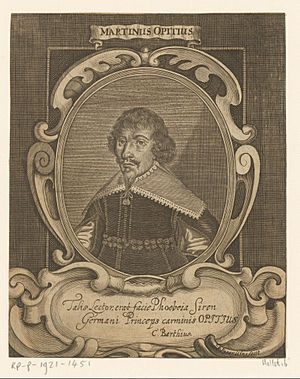Martin Opitz facts for kids
Martin Opitz von Boberfeld (born December 23, 1597 – died August 20, 1639) was a very important German poet. Many people thought he was the best poet in Germany during his time. He helped create new rules for German poetry, making it more organized and clear.
Quick facts for kids
Martin Opitz
|
|
|---|---|
 |
|
| Born | 23 December 1597 Bolesławiec |
| Died | 20 August 1639 Gdańsk |
| Other names | Der Gekrönte |
| Occupation | Poet, literary theorist, writer |
| Movement | Baroque |
| Signature | |
Early Life and Education
Martin Opitz was born in a town called Bunzlau (today Bolesławiec) in a region of Germany called Lower Silesia. His father was a successful citizen.
He went to school in his hometown, where his uncle was in charge. Later, he studied at another high school where he focused on French, Dutch, and Italian poetry.
In 1618, he started studying at the University of Frankfurt-on-Oder. That same year, he wrote his first important essay, Aristarchus. In this essay, he argued that the German language was good enough for writing beautiful poetry.
Travels and Career
In 1619, Opitz moved to Heidelberg. There, he became a leader among young poets at the university. The next year, he visited Leiden and learned from the famous Dutch poet Daniel Heinsius. Opitz had already translated some of Heinsius's poems into German.
He then spent a year (1622) as a philosophy professor at a school in Weißenburg. After this, he traveled and worked for different noble families.
In 1624, Opitz became a councilor for Duke George Rudolf in Liegnitz and Brieg. In 1625, he wrote a special poem after the death of Archduke Charles of Austria. Because of this poem, Emperor Ferdinand II named him a "poet laureate," which is a great honor. A few years later, the Emperor gave him the noble title "von Boberfeld."
He joined a famous literary group called the Fruitbearing Society in 1629. In 1630, he went to Paris and met the important thinker Hugo Grotius.
Later Life and Legacy
In 1635, Opitz settled in the city of Danzig (now Gdańsk, Poland). There, King Władysław IV Vasa of Poland made him his official historian and secretary.
Sadly, Martin Opitz died in Danzig on August 20, 1639, from the plague. He was 41 years old.
Opitz was seen as the most important German poet of his time. He led a group of poets known as the First Silesian School. Even though his poems might not seem like masterpieces today, he is called the "father of German poetry" because he set clear rules for how German poetry should be written.
His book, Buch von der deutschen Poeterey (1624), was very important. It stopped the mix-and-match style of poetry that was common before. Instead, it set rules for using pure language, clear style, and proper verse and rhyme in German poems.
Opitz's own poems followed these strict rules. They were often formal and thoughtful, focusing on specific topics rather than strong emotions. Some of his best poems include Trost-Gedichte in Widerwärtigkeit des Krieges (Poems of Comfort in Times of War) and Lob des Feldlebens (Praise of Country Life). These poems often described things or taught lessons.
In 1624, he published a collection of his poems. His work Dafne (1627), with music by Heinrich Schütz, is considered the first German opera. He also edited Das Annolied, an old German poem from the 11th century, saving it from being lost forever. Opitz also wrote a pastoral novel called Schäferei der Nymphe Hercinie (The Idyll of the Nymph Hercinie, 1630).
Images for kids
See also
 In Spanish: Martin Opitz para niños
In Spanish: Martin Opitz para niños
 | Mary Eliza Mahoney |
 | Susie King Taylor |
 | Ida Gray |
 | Eliza Ann Grier |



